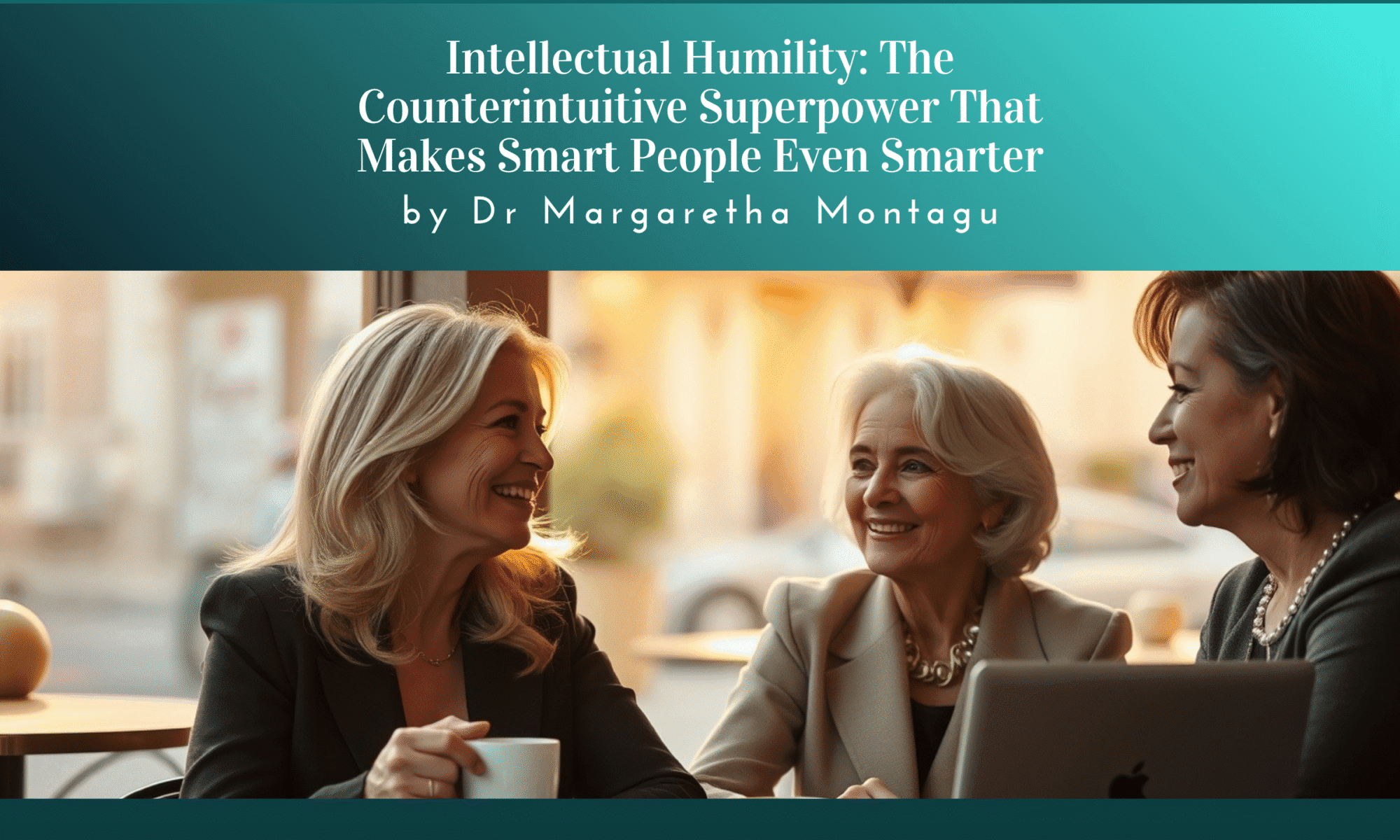How admitting “I don’t know” can transform your relationships
What this is: A practical exploration of intellectual humility, the art of knowing what you don’t know, and why the happiest people are those brave enough to admit their blind spots.
What this isn’t: A call to become indecisive, self-doubting, or to abdicate your expertise. This isn’t about diminishing your accomplishments; it’s about amplifying your capacity to grow.
Read this if: You’re exhausted from always having to have all the answers. You’ve noticed your certainty sometimes costs you relationships. You’re ready to lead with wisdom rather than just intelligence. You suspect there might be freedom in the phrase “I could be wrong.”
Five Key Takeaways
- Intellectual humility doesn’t weaken your authority; it strengthens it. When you acknowledge gaps in your knowledge, people trust you more, not less.
- The smartest people in the room are often those willing to say, “Teach me.” Curiosity is the hallmark of true intelligence, not the illusion of omniscience.
- Being intellectually humble reduces stress and anxiety. When you stop defending every position as if your identity depends on it, you breathe easier.
- It transforms conflict into collaboration. Arguments become explorations. Disagreements become opportunities to learn rather than battles to win.
- Intellectual humility can be mastered. It’s not a personality trait you either have or don’t have, it’s a practice you can cultivate, starting today.
| Use this prompt to ask AI to help you learn something new: “Help me design a personalised learning plan for mastering [subject]. Break it down into daily learning tasks, recommended resources, and practical exercises I can do to build my skills.” |
Introduction: The Paradox at the Heart of Success
I came across the term “intellectual humility” for the first time recently as I was reading an article in the Greater Good Magazine. I though it may be interesting to look into it, in more depth, considering the opinionated times we live in.
Why? Because the very traits that got you to the top, your decisiveness, your confidence, your ability to analyse complex situations and make bold calls, may now be the cage keeping you trapped in stress, frustration, and diminishing returns.
You’ve spent decades building credibility. You’re the person people turn to for answers. Your opinion carries weight in boardrooms, strategy sessions, and family decisions. You’ve earned your expertise through late nights, hard lessons, and relentless dedication. So why would you ever admit you don’t know something?
Because intellectual humility, the capacity to recognise the limits of your knowledge and remain open to new information, might be the single most valuable skill you haven’t yet fully embraced. It’s the counterintuitive secret that separates leaders who burn out from those who evolve. It’s what transforms strained relationships into genuine connections. And it’s a quality that can help you sleep better at night, even when you don’t have all the answers.
My mentoring approach, refined by personal experience over many, many years, is based on the premise that true transformation begins not with adding more knowledge, but with creating space, space to question, space to be wrong, space to grow. Over 20 years of working with executives and professionals in stress management, I’ve witnessed a pattern: the most resilient leaders aren’t those with the most answers, they’re those comfortable with the most questions.
The Story of Catherine Ainsworth
Catherine Ainsworth had perfected the art of certainty. As the Chief Operating Officer of a mid-sized pharmaceutical company, she’d built her reputation on making tough calls quickly and being right more often than not. The data was her religion, the spreadsheet her bible, and her track record spoke for itself: three consecutive years of revenue growth, a streamlined supply chain that competitors envied, and a team that, though occasionally resentful of her exacting standards, consistently delivered results.
But at 47, Catherine was exhausted in a way that no amount of sleep could fix.
Eventually, the cracks began to show.
She was sitting in the executive conference room, the autumn light streaming through floor-to-ceiling windows, illuminating dust motes that danced above the polished mahogany table. Her CFO, Marcus, was presenting an alternative approach to the Q4 strategy, one that diverged significantly from Catherine’s proposal.
She could feel her jaw tightening, that familiar sensation of her teeth pressing together as Marcus spoke. Her fingers drummed against her leather portfolio, a staccato rhythm of impatience. The room smelled of fresh coffee and the faint vanilla scent of someone’s perfume, but Catherine tasted only the metallic edge of defensiveness on her tongue.
“The problem with that approach,” she interrupted, her voice clipped and precise, “is that it ignores the supply chain vulnerabilities we identified in Q2. We’ve already analysed this.”
Marcus paused, his shoulders dropping almost imperceptibly. Around the table, eyes shifted downward to notes that suddenly required intense scrutiny. The silence stretched like taffy, uncomfortable and sticky. Catherine could hear the hum of the air conditioning, the soft tap of someone’s pen against paper, the sound of her own pulse in her ears.
She won that meeting, as she usually did. But as she returned to her office, the victory felt hollow. Through her glass walls, she could see her team, heads bent over their desks, and she realised with a jolt how rarely anyone challenged her anymore. How often meetings ended with nods of agreement that felt more like resignation than genuine consensus.
That evening, Catherine sat in her BMW in the underground car park, unable to summon the energy to drive home. Her fingers gripped the steering wheel, knuckles white, and she felt the leather’s grain pressing into her palms. The fluorescent lights cast everything in a sickly green hue. She could smell engine oil and concrete, that particular scent of enclosed spaces where cars live instead of people.
Her phone buzzed. A text from her daughter: “Mom, are you coming to my recital or are you too busy being right about everything?”
Catherine’s breath caught. The words stung precisely because they were true. When had “being right” become her primary mode of existing? When had her need for certainty transformed from an asset into a wall, one that kept her apart from her team, her family, herself?
She thought about her marriage, dissolved three years earlier. “You can’t just listen, can you?” her ex-husband had said during one of their final arguments. “You always have to correct, to improve, to show me the better way. Sometimes I just need you to be uncertain with me.”
Sitting in that car park, the engine cooling with soft metallic ticks, Catherine felt something crack open inside her. Not breaking, exactly. More like the first fissure in a chrysalis. She didn’t have the words for it yet, but she was touching the edge of intellectual humility, the recognition that her relentless certainty had become both her shield and her prison.
The next morning, Catherine did something unprecedented. She walked into the executive suite and asked Marcus to coffee. “Tell me more about your Q4 proposal,” she said, and then, with words that felt foreign but somehow liberating in her mouth: “I think I might have dismissed it too quickly. I’d like to understand what I’m missing.”
Marcus’s expression shifted from wariness to something resembling hope. And Catherine felt, for the first time in months, the lightness that comes with putting down a burden you didn’t realise you were carrying.
Over the following weeks, as she began practising what she’d later learn to call intellectual humility, Catherine noticed something remarkable. Her team started speaking up more. Meetings became laboratories for ideas rather than stages for her expertise. Her blood pressure, which had been creeping upward for years, began to normalise. She slept better. She laughed more.
And her daughter started texting more often, messages that began with “I’ve been thinking about what you said” rather than complaints about what she hadn’t heard.
Catherine’s journey was just beginning, but she’d discovered that intellectual humility isn’t weakness dressed up as virtue. It’s the courage to grow, even when you’ve already arrived.
What Is Intellectual Humility, and Why Does It Matter?
The Definition: More Than Just Admitting You’re Wrong
Intellectual humility is the recognition that your beliefs, knowledge, and perspectives are inherently limited and potentially flawed. It’s the capacity to hold your convictions lightly enough to examine them honestly, to welcome contradictory evidence without defensiveness, and to change your mind when the facts warrant it.
But here’s what makes it truly powerful: intellectual humility isn’t self-deprecation. It’s not about thinking less of yourself, it’s about thinking of yourself less often. It’s the difference between “I might be wrong” (humility) and “I’m probably wrong about everything” (lack of confidence). One opens doors; the other closes them.
Research in psychology and organisational behaviour reveals that intellectually humble people actually make better leaders, maintain stronger relationships, learn faster, and experience less anxiety. They’re not paralysed by doubt, they’re liberated by curiosity. In my work with executives during our Camino de Santiago stress management retreats, I’ve observed this transformation repeatedly: when people give themselves permission to not know, they paradoxically become more effective at navigating complexity.
The Neuroscience of Certainty and Why We Cling to It
Our brains are prediction machines, constantly creating models of reality and then defending those models as if our survival depends on it. In our evolutionary past, it often did. Uncertainty triggered the amygdala, our brain’s threat-detection system, because not knowing where the predator lurked could mean death.
Today, intellectual threats activate the same neural pathways. When someone challenges your deeply held belief, your brain processes it similarly to a physical threat. Your heart rate increases, stress hormones flood your system, and your prefrontal cortex, responsible for nuanced thinking, goes partially offline. You literally become less intelligent when your certainty is challenged. See Porter T, Elnakouri A, Meyers EA, Shibayama T, Jayawickreme E, Grossmann I. Predictors and consequences of intellectual humility. Nat Rev Psychol. 2022;1(9):524-536.
This is why intellectual humility is both difficult and essential. It requires overriding your brain’s protective instincts in service of growth. It demands that you befriend uncertainty rather than banish it. Through two decades of clinical practice and fifteen years hosting transformative retreats where guests walk the Camino de Santiago, I’ve witnessed how powerful this shift can be when people learn to sit with “I don’t know” without panic. See also Bąk W, Wójtowicz B, Kutnik J. Intellectual humility: an old problem in a new psychological perspective. Current Issues in Personality Psychology. 2022;10(2):85–97.
The Professional Benefits: Why Humble Leaders Outperform
Study after study confirms what seems counterintuitive: leaders who display intellectual humility create more innovative, engaged, and profitable organisations. Why? Because they:
Build psychological safety. When the leader can say “I was wrong” or “I need help understanding this,” team members feel safe to take risks, admit mistakes, and propose unconventional ideas.
Make better decisions. By actively seeking disconfirming evidence and diverse perspectives, intellectually humble leaders avoid costly confirmation bias and groupthink.
Adapt faster. In rapidly changing environments, the ability to update your mental models quickly is more valuable than being right initially.
Inspire loyalty. People don’t trust perfection, they trust authenticity. A leader who admits limitations appears more credible, not less.
Reduce team stress. When perfectionism isn’t the standard, everyone breathes easier. Teams led by intellectually humble managers report lower burnout and higher job satisfaction.
In my Road Map to Resilience online course, we explore how intellectual humility serves as a foundation for career transitions and leadership evolution. It’s not about abandoning your expertise, it’s about holding it with an open hand.
If you’re feeling overwhelmed, exhausted, or on the edge of burnout, you need immediate support. The Road Map to Resilience: Burnout to Brilliance online course (with the option of adding coaching sessions) is designed for exactly that: a practical, step-by-step course to help you regain control, rebuild your energy, and find clarity in the chaos. This isn’t a quick fix—it’s about proven strategies to calm your nervous system, shift your mindset, and create sustainable resilience. No need to cope with this on your own—let’s get you back on track.

How Intellectual Humility Transforms Those Around You
The Ripple Effect in Relationships
When you embrace intellectual humility, something remarkable happens in your relationships. Arguments lose their edge. Your partner’s different perspective becomes interesting rather than threatening. Your children feel heard rather than corrected. Your colleagues become collaborators rather than competitors.
This isn’t just about keeping the peace, it’s about accessing collective wisdom. Every person in your life has knowledge you lack, experiences that could inform your blind spots, and insights that could shift your trajectory. But they’ll only share them if they believe you’re genuinely open to being influenced.
I’ve written eight books about divorce, loss, unexpected illness, and coping with crises, and one pattern emerges consistently: relationships fracture not because people disagree, but because they defend their convictions as if life itself is at stake. Intellectual humility reverses this. It says, “Your perspective matters more than my need to be right.”
The Community Impact: Leadership That Lifts
When you model intellectual humility, you give others permission to do the same. You create cultures, whether in your organisation, your family, or your community, where learning is valued over looking smart, where curiosity trumps certainty, where “I changed my mind” is celebrated as growth rather than criticised as inconsistency.
This matters beyond your immediate circle. In a world fractured by polarisation and rigid ideologies, intellectual humility is a form of radical hope. It suggests that bridge-building is possible, that we can hold strong values without demonising those who disagree, that complexity can be navigated without pretending everything is simple.
The people who attend my retreats often describe a profound shift: from seeing themselves as islands of competence to recognising they’re part of an ecosystem of wisdom. With over 30 testimonials on my website speaking to these transformations, the pattern is clear: intellectual humility doesn’t just change you, it changes the people around you.
How to Cultivating Intellectual Humility – three Options
A Writing Prompt
Set aside 20 minutes in a quiet space. Consider a belief you hold with strong conviction, something you feel certain about in your professional or personal life. Now write:
Part 1: Describe this belief in detail. Why do you hold it? What evidence supports it? How has it served you?
Part 2: Now, imagine you’re wrong. Not slightly mistaken, but fundamentally incorrect about this belief. Write from that perspective. What would the evidence for the opposite view look like? What would you need to revise about your understanding?
Part 3: Reflect on what this exercise felt like. Did you resist? Did you discover nuances you hadn’t considered? What might you be missing by holding this belief too tightly?
This practice, inspired by the reflective work we do during Inner Camino storytelling circles, isn’t about abandoning your convictions. It’s about loosening your grip enough to examine them honestly.
A Gratitude and Intention-Setting Exercise
Each morning for the next week, practice this brief ritual:
Gratitude: Identify one thing you learned yesterday that challenged or expanded your previous understanding. It might be small (“I learned my colleague’s scepticism comes from a past project failure I knew nothing about”) or significant (“I realised my approach to work-life balance isn’t the only valid one”). Express gratitude for that learning.
Intention: Set an intention for intellectual humility today. It might be: “I will ask three questions before offering my opinion in meetings,” or “I will respond to criticism with ‘Tell me more’ instead of defending myself,” or “I will notice when I feel defensive and breathe before responding.”
An AI Prompt
| Use this prompt to ask AI to help you examine your convictions: “Act as an expert on [your conviction], explain the most important concepts, and provide real-world examples to illustrate each. Then, give me a step-by-step guide to master this topic in the next 30 days.” |
Further Reading: Five Books on Intellectual Humility
1. “Think Again: The Power of Knowing What You Don’t Know” by Adam Grant
Grant, an organisational psychologist at Wharton, makes a compelling case for the joy of being wrong. His research-backed insights into how successful people update their beliefs make this essential reading. I chose this book because it bridges rigorous science with practical application, perfect for evidence-driven professionals.
2. “The Scout Mindset: Why Some People See Things Clearly and Others Don’t” by Julia Galef
Galef distinguishes between “soldier mindset” (defending your beliefs) and “scout mindset” (mapping the terrain accurately). This book offers concrete techniques for developing intellectual humility without sacrificing conviction. It’s particularly valuable for leaders who need to make decisive calls while remaining open to new information.
3. “Humble Inquiry: The Gentle Art of Asking Instead of Telling” by Edgar Schein
Schein, a pioneer in organisational culture, demonstrates how asking the right questions builds relationships and solves problems more effectively than having all the answers. This book transformed how I facilitate the storytelling circles during our retreats, showing how curiosity creates connection.
4. “Being Wrong: Adventures in the Margin of Error” by Kathryn Schulz
Schulz explores the experience of being wrong with humour and philosophical depth. She argues that our capacity for error is inseparable from our capacity for genius. I included this because it reframes “wrongness” as not just acceptable but essential to the human experience.
5. “The Wisdom of Insecurity: A Message for an Age of Anxiety” by Alan Watts
Watts, the philosopher who bridged Eastern and Western thought, explores how our pursuit of security and certainty creates the very anxiety we’re trying to escape. This contemplative book pairs beautifully with the physical practice of walking, which is why I often recommend it to retreat participants.
P.S. For a practical, accessible guide to navigating life transitions with humble curiosity, explore my book Embracing Change, in 10 minutes a day. It offers daily practices for building psychological flexibility, including exercises that cultivate intellectual humility during uncertain times.
From the Inner Camino Community: Real Stories of Transformation
Testimonial from a Camino de Santiago Retreat Guest:
“I arrived at Dr Montagu’s Camino de Santiago walking retreat convinced I had my life figured out. I was a successful consultant, used to being the smartest person in the room. But during our evening storytelling circle with the Friesian horses present, something shifted. When Margaretha gently asked, ‘What if your certainty is costing you connections?’ I felt defensive. Then I felt tears. By the end of the week, walking those ancient paths and sharing vulnerably with strangers who became friends, I discovered that admitting ‘I don’t know’ wasn’t weakness, it was freedom. My relationships at home have transformed. My teenage son actually talks to me now because I’ve stopped lecturing and started listening.” — Richard M., Management Consultant, London
Testimonial from a Virtual Storytelling Circle Member:
“Joining Dr Montagu’s virtual storytelling circle was a leap of faith during a difficult career transition. I’d always been the one with the plan, the answers, the five-year strategy. But redundancy at 52 shattered that identity. In the circle, I learned to hold my story lightly, to listen without immediately problem-solving, to say ‘I’m still figuring this out’ without shame. The other members modelled intellectual humility in the most beautiful ways, sharing their own uncertainties, their revised beliefs, their works in progress. Being part of this community taught me that wisdom isn’t having all the answers, it’s being brave enough to sit with the questions. I’m now in a new role that I never would have considered before because I was finally open to paths I hadn’t predetermined.” — Jennifer L., Former Financial Director, Manchester
Frequently Asked Questions About Intellectual Humility
Doesn’t intellectual humility make you appear weak or indecisive as a leader?
Quite the opposite. Research shows that leaders who display intellectual humility are perceived as more competent and trustworthy, not less. There’s a crucial distinction between intellectual humility (“I might be missing something, let’s examine all angles”) and chronic indecisiveness (“I can’t make up my mind”). Strong leaders make decisions, but they do so after genuinely considering alternative viewpoints. When you admit what you don’t know, people trust what you say you do know.
How do I balance intellectual humility with the need to project confidence in high-stakes situations?
Confidence and humility aren’t opposites, they’re dance partners. You can be absolutely confident in your values, your commitment to finding the best solution, and your ability to navigate complexity, while remaining humble about whether your current understanding is complete. In high-stakes situations, saying “Based on current information, here’s my recommendation” is both confident and humble. It demonstrates decisiveness while acknowledging that you’ll adjust if better data emerges.
Won’t people take advantage of me if I admit I don’t know things?
This concern usually reflects past environments where vulnerability was punished. In healthy systems, intellectual humility builds respect rather than inviting exploitation. People who might take advantage of genuine openness are revealing their own character, not exposing a flaw in your approach. Moreover, pretending to know what you don’t creates far greater vulnerability, when you’re eventually found out, which is inevitable, you lose credibility permanently.
How can I develop intellectual humility when my entire career has been built on being the expert?
Your expertise remains valuable, intellectual humility doesn’t erase it. Instead, it expands your expertise by making you coachable and adaptive. Start small: in low-stakes situations, practice saying “I hadn’t considered that angle” or “Tell me more about your thinking.” Notice that the world doesn’t end. In fact, you’ll likely find that people engage more deeply with you. Your expertise becomes more impactful when it’s offered as a contribution rather than a declaration.
Is there such a thing as too much intellectual humility?
Yes, though it’s rare. Intellectual humility becomes problematic when it slides into self-doubt or prevents you from acting on well-founded knowledge. If you find yourself paralysed by uncertainty or dismissing your own expertise automatically, you’ve overcorrected. Healthy intellectual humility says, “I’m confident in what I know, and I’m open to learning more.” It’s the integration of confidence and curiosity, not the abdication of judgment.
Conclusion: The Courage to Admit We Do Not Know
In a world that rewards certainty, choosing intellectual humility is an act of courage. It’s the recognition that your growth matters more than your image, that connection matters more than being right, that wisdom is found not in having all the answers but in asking better questions.
As David Foster Wallace observed, “The truth will set you free. But not until it is finished with you.” Intellectual humility is the willingness to be finished with, to let truth refine you rather than defend yourself against it. It’s uncomfortable work. It requires dismantling the fortress of certainty you’ve built brick by brick over decades. But on the other side of that dismantling is something more valuable than being right: the freedom to keep growing.
You’ve achieved remarkable things with your intelligence, your decisiveness, your expertise. Imagine what becomes possible when you add humility to that already impressive foundation. Imagine leading teams where people bring you their wildest ideas because they know you’ll truly consider them. Imagine relationships where disagreement becomes opportunity rather than threat. Imagine sleeping soundly, knowing you don’t have to have all the answers because you’re part of a community of seekers, all fumbling toward truth together.
The path of intellectual humility doesn’t diminish you. It liberates you. And that liberation ripples outward, touching everyone you lead, love, and serve.
The question isn’t whether you know enough. The question is: Do you understand the need to keep on learning?
Your Invitation: Walk the Camino, Transform Your Relationship with Certainty
Imagine seven days where the only thing you need to know for certain is which foot to place next on an ancient pilgrim path. Where the rhythm of walking, the beauty of the French countryside in Gascony, and the companionship of fellow seekers creates space for the kind of transformation that’s impossible to schedule into your already-packed calendar.
My Camino de Santiago Crossroads walking retreats in the south-west of France offer something increasingly rare: permission to not have it all figured out. Each day, you walk through stunning landscapes, practising mindfulness and meditation techniques designed specifically for people who carry the weight of responsibility like a second skin. The walking itself becomes a metaphor for intellectual humility; you can’t rush the path, you can’t control the terrain, you can only show up present for each step.
Evenings are spent in our storytelling circles, sometimes in the peaceful presence of my Friesian horses, who have an uncanny ability to reflect back our authentic selves without judgment. Here, we become simply human, sharing vulnerabilities, asking questions that have no easy answers, practising the art of listening without needing to fix or solve. Participants consistently describe these circles as the most transformative element of the retreat, the place where intellectual humility shifts from concept to lived experience.
This isn’t a holiday, though the setting in the south-west of France is undeniably beautiful. This is intentional time away from the demands of your high-performance life to reconnect with the curiosity and openness that first fuelled your success before certainty became your default mode. It’s where you remember that “I don’t know” can be the beginning of wisdom rather than the admission of weakness.
With 15 years of hosting these retreats and a varied collection of testimonials speaking to their impact, I’ve witnessed again and again how the combination of walking, mindfulness practices, and authentic community creates lasting shifts in how participants lead, relate, and live. You’ll return not with all the answers, but with something better: the capacity to sit with uncertainty while still moving forward with purpose.
Spaces are intentionally limited to preserve the intimacy and depth of the experience. If you’re ready to trade the exhausting weight of certainty for the liberating practice of intellectual humility, I’d be honoured to host you.
Learn more and reserve your spot.









Stress destroys Lives. To find out what you can do to safeguard your sanity by taking my insight-giving quiz, subscribe to my mailing list.
Use all suggested AI prompts with circumspection.
Dr Margaretha Montagu, MBChB, MRCGP, NLP Master Practitioner, Medical Hypnotherapist, Life Transition Coach, has spent 20 years supporting stressed professionals in finding sustainable wellbeing and 15 years guiding transformative walking retreats on the Camino de Santiago. She is the author of eight books on navigating life’s inevitable transitions and the creator of the Inner Camino approach to stress management and personal growth.
Latest Posts

